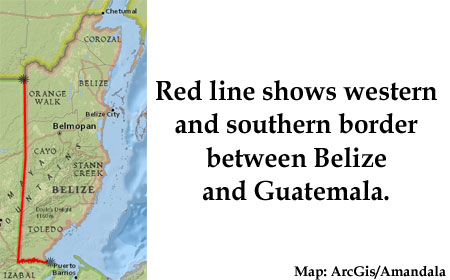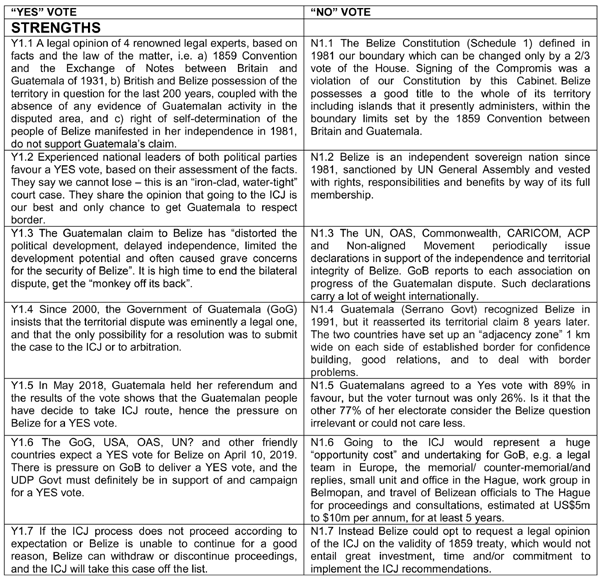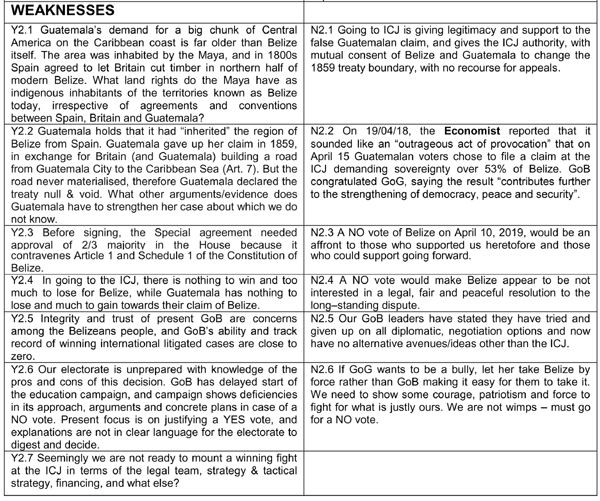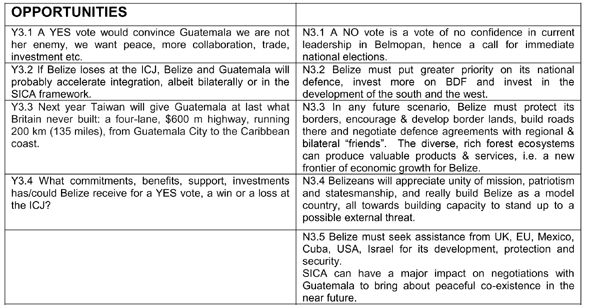The Referendum question (per Article 2 of the Special Agreement) on which Belizeans will vote on 10 April, 2019, reads as follows:
“Whereas the parties request the International Court of Justice (ICJ) to determine, in accordance with applicable rules of international law as specified in article 38-1 of the statute of the Court, any and all legal claims of Guatemala against Belize to land and insular territories and to any maritime areas pertaining to these territories, to declare the rights therein of both parties, and to determine the boundaries between their respective territories and areas.”
After following TV shows and news outlets on the ICI referendum, I have been rather disappointed with the quality of the past presentations, content, and organization of the whole educational campaign. The whole campaign, seemingly based on the GoB position, is not doing justice to strategic importance of the topic for the future of Belize. The official campaign spokespeople are disrespecting and dismissing the Vote NO option arguments and concerns.
For my own benefit, I started to read and assemble a holistic analysis to bring together all the points of view and issues of both a Yes vote and a No vote on the ICJ. I think the best framework for this, in terms of the ease for the average Belizean to follow the discussion, is the SWOT matrix, which should simplify the issues involved, and help to compare both options in the most succinct and logical order.
Here is a preliminary analysis of the strengths, weaknesses, opportunities and threats (SWOT)) of a YES and a NO vote on the ICJ referendum, presented from a Belizean perspective.
No doubt, the analysis on both sides could be strengthened by editing, amplifying and/or adding more points to bolster the arguments on each option.
The International Court of Justice: If the majority of the vote is a YES, then the dispute will be taken to the International Court of Justice (ICJ). The ICJ was established in 1945 as the principal judicial organ of the United Nations (UN). The Court’s role is to settle, in accordance with international law, legal disputes submitted to it by states and to give advisory opinions on legal questions referred to it by authorized United Nations organs and specialized agencies. The Court is composed of 15 judges, who are elected for terms of office of nine years by the UN General Assembly and the Security Council.
According to its website, the ICJ may entertain two types of cases:
1. legal disputes between States submitted to it by them (contentious cases), and
2. request for advisory opinions on legal questions referred to it by United Nations organs and specialized agencies.
According to Article 38.1, the Court must apply in our case (Belize/Guatemala dispute):
• international treaties and conventions in force;
• international custom;
• general principles of law;
• judicial decisions; and
• teachings of the most highly qualified publicists.
Moreover, if the parties agree, the Court can decide a case without confining itself to existing rules of international law.
A case may be brought to a conclusion at any stage of the proceedings by a settlement between the parties or by discontinuance. In case of the latter, an applicant state may at any time inform the Court that it does not wish to continue the proceedings, or the two parties may declare that they have agreed to withdraw the case. The Court then removes the case from its List.
By signing the Charter, a UN Member State undertakes to comply with the decision of the Court in any case to which it is a party. Since, furthermore, a case can only be submitted to the Court and decided by it if the parties have in one way or another consented to its jurisdiction over the case, it is rare for a decision not to be implemented.
If a state considers that the other side has failed to abide by the obligations incumbent upon it under a judgment rendered by the Court, the ICJ does not have any enforcement mechanism. The state may bring the matter before the Security Council, which is empowered to recommend or decide upon measures to be taken to give effect to the judgment, e.g. economic sanctions.
For the Belize/Guatemala case, the ICJ will comprise of 15 elected judges. However, 2 ad-hoc judges will be nominated to the court, one each by Belize and by Guatemala, respectively. Additionally, the countries will have the representation from an agent at the Court, whose function will be to submit documents on behalf of the country. The agent must have high diplomatic skills, good knowledge of foreign policy, and extended knowledge of international law.
In preparation for adjudication, the Ministry of Foreign affairs (of Belize) will organize a multidisciplinary team including legal counsel, international law experts, and the team that will conduct all the research, compile documents and evidence for the court.
Since Guatemala is the claimant country, they would submit a memorial, i.e. a presentation of her case, of up to 150 pages of volume, substance and annexes on the dispute. Belize would receive the memorial and respond with a counter-memorial (admit, deny or comment on a memorial on international law.
The ICJ’s decision in cases of dispute between countries is not predictable and after the final judgment, there is a legal responsibility by both countries to implement and enforce the ruling.
Based on the cases shown in table 1 below, the entire process with take about 5 years from the moment the application for instituting proceedings is submitted until a final judgment is rendered.
Tentative Conclusions: Given all our social, economic and governance problems in Belize, it would be wise to postpone the whole ICJ process. Taking into account the above analyses, I can understand why the YES vote should be preferred and also why the NO vote has a justifiable cause, simply stated because: a) we are not ready, b) the opportunity cost would be extremely high for us to prepare for and participate in the ICJ proceedings, c) the tangible (maybe intangible) benefits, if we win, are negligible at best, and d) there is a probability, though low, we could lose something at the ICJ. At least these issues/questions should be addressed before the people agree to a YES vote.
There is no reason to fear the ICJ. However, the entire process of fighting a case in The Hague will be time-consuming and expensive, much more costly and challenging than any case the GoB has ever undertaken. But GoB is absolutely confident and positive about winning and resolving this unfounded claim once and for all. What we know for sure is that both Governments want to win, and both will/should do all in their power to be triumphant, otherwise why go?
On the side of Belize, why take the risk of going to the ICJ if we are not sure our leaders and economic capability are really fit for this enormous undertaking? It could be wise for us to wait on better times. In time, there is hope that the leadership and the economy of Belize will improve, there is hope that Guatemala will be better governed and focused on bilateral cooperation and development, and there is hope that SICA and our Central American networks will produce positive results to the level that the Guatemalan claim could become a non-issue, an irrelevant point in our bilateral relations.
In summary, the SWOT analysis points to 5 major factors of risk and und uncertainty for proceeding to a YES vote:
1) Lack of knowledge on the exact land claims and the “legal”and any other justifications of Guatemala. One risk is that our boundaries may have to be adjusted by the ICJ to grant some benefit to appease Guatemala’s claim.
2) Levels of integrity, trust-worthiness and transparency of GoB as shown by lack of confidence in recent policy decisions, e.g. signing the Compromis, being “soft”on the Sarstoon issue, and committing to a bias YES vote campaign from the start.
3) Ability and resources of Belize (and who would help Belize) to mount a winning legal team, strategy and effort at the ICJ.
4) Probability of Belize losing at the ICJ and having a game plan to cope with the fallout for affected Belizeans.
5) Credibility, ability and interest of Guatemala to implement an ICJ judgment in the case of victory for Belize.
Addressing these issues to the satisfaction of the Belizean electorate would definitely strengthen the case for the YES vote option.






